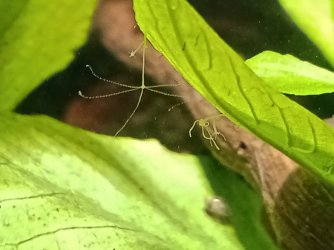Thermal
New Member
Recently found hydras hanging out in my 5 gal and since the tank is only 6 days old, I'm assuming it's normal to have small infestations like this?
My concern is, should I just let them do their thing? I know they're a threat to baby shrimp, and baby fish, but I don't have any of those and I'm not planning on getting any, so that makes them pretty much harmless?
I heard that snails would gobble them up too, I have bladders and rams but they don't really give a damn, especially that guy in the back.
Holding back on using any medicine right now as I don't want to accidentally harm anything else in the tank, but I have hydrogen peroxide at the ready just in case they get out of hand. I probably wouldn't even try to remove them if they do happen to not be a threat, also I wanna see what they do..
going to be adding a betta in 2 months and nothing else. I doubt the hydras will be a threat to it, though I'm concerned that they will multiply. Will they just go away on their own once the tank gets older? Like how new tanks always get microfauna population explosions, that go away after a few weeks?


